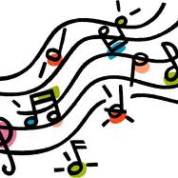
“Let the word [spoken by] Christ (the Messiah) have its home [in your hearts and minds] and dwell in you in [all its] richness, as you teach and admonish and train one another in all insight and intelligence and wisdom [in spiritual things, and as you sing] psalms and hymns and spiritual songs, making melody to God with [His] grace in your hearts (Colossians 3:16 AMP).”
Music is a gift from God that that has the power to be a balm to a person’s soul, speak healing to a person’s heart and lift a person’s spirits. Music Therapists say that most people, regardless of their condition or disability, exhibit a capability of response to music or elements of music such as rhythm, tone, etc. It is often said that ‘God inhabits the praises of His people (cf. Psalm 22:3)’. Even when a person is going through, God enthrones our praises.
It’s A Heart Matter!
Christian Music Therapy involves the use of aspects of sacred music to promote physical, mental, and emotional health and well-being. In a typical music therapy session, the therapist will ask the counselee or client (person receiving counsel/therapy) to participate in musical activities (i.e. listening, singing, playing, improvising or composing). Counselees do not need to have previous musical training to benefit from music therapy. All one needs to do is graciously work with the Music Therapist with gratitude in your heart and God will do the rest.
A Christian Music Therapist may incorporate worship, prayer and Scripture into counseling sessions according to the client’s/counselee’s needs and as the Holy Spirit leads. Professional music therapists have found that it is best to use the genre and specific music that is known to the client/counselee. The setting for music therapy is just as important as it is for any other counseling room or therapeutic atmosphere. The venue for therapeutic healing should be a calm place, without ambient sounds, and equipped for the listening pleasure of the client, counselee or patient. Similarly, the volume of music (loud, moderate or soft) is also very important. Loud music creates tension, increases perspiration rate and decreases sense of concentration. Music with a moderate volume tends to ward off fear. Soft music, on the other hand, calms the mind, relaxes the nerves, and serves as a soporific thereby tending to induce drowsiness or sleep.
Christian therapy is an important consideration for believers who are looking to improve their mental, emotional, spiritual and even physical health. Christian therapy must counsel the soul with therapeutic techniques that are generated by the Spirit of God and align with Biblical principles.
Music Therapy is an established health profession in which music is used within a therapeutic context to address physical, emotional, cognitive, and social needs. Music therapy can also provide an alternative form of communication for those who may be finding it difficult to express themselves in words.
How to Choose A Music Therapist
A Music Therapist is someone who has earned a bachelor’s or master’s degree in the field of music therapy. After completion of their academic studies (which includes coursework, clinical practicum, and research), they are required to perform a six-month clinical internship and take a Board Certification Exam. Successful completion of three criteria (college degree, clinical internship and board certification) leads to the designation of Music Therapist – Board Certified or MT-BC. Other professional designations include: Registered Music Therapists (RMT), Certified Music Therapists (CMT), and Advanced Certified Music Therapist (ACMT) if he/she does not have these credentials, they are not a professional music therapist.
Music Therapy Interventions
According to the American Music Therapy Association (AMTA), music therapy interventions can be designed to:
• Promote Wellness
• Manage Stress
• Alleviate Pain
• Express Feelings
• Enhance Memory
• Improve Communication
• Promote Physical Rehabilitation
When we sing and listen to sacred music, we are honoring God and He intervenes and inhabits the ‘praises of His people’. Music Therapists should not only diagnose ailments, but also try to make accurate suggestion of the type of music and instruments that will best results in the client’s/counselee’s healing.
You may also be interested in the following articles by Dr. Linda: “Christian Music As Therapy, A Biblical Perspective”, “Music As Therapy, A Clinical Perspective” and “Christian Music As Therapy, A Genre Perspective”.
*The scriptures noted in this post are from the New King James Version (NKJV) unless otherwise noted. You are welcome to reprint this article provided the author information, below, is included.
Dr. Linda H. King is the Founder, President & Chief Ministry Officer of Soul Care Ministries International, Inc. and The Soul Care Institute™, an N.C.C.A. Certified Academic Institution; an Ordained Minister of the Gospel and N.C.C.A. Licensed Clinical Pastoral Counselor – Board Certified; Christian Coach, Mentor, Speaker and Blogger. Dr. King can be reached 1 (888) 761-5777 begin_of_the_skype_highlighting
 FREE 1 (888) 761-5777 end_of_the_skype_highlighting, Ext 1 or www.soulcareministries.org/contact.
FREE 1 (888) 761-5777 end_of_the_skype_highlighting, Ext 1 or www.soulcareministries.org/contact.


